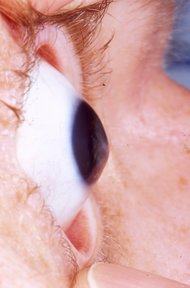FOR YOUR PATIENTS AND PRACTICE
The latest in lensmeters
* Marco and Nidek launched the LM-1200 Automatic Lensmeter at Vision Expo West last month. The LM-1200 uses Hartmann Shack technology to read 108 points on a lens, allowing users to determine instantly the add power of a progressive lens. Other features include a new ergonomie design, automatic lens type detection (automatically detects whether the lens is single vision or progressive and switches to correct mode), prism lens measurement, progressive channel width, progressive length and prism layout screen (allows optician to block an un-cut lens to include prism).
Marco Ophthalmic
Phone: (800) 874-5274
Web: marco.com
CIRCLE 1 ON YOUR READER SERVICE CARD.
Custom toric contact lens
* Unilens Vision introduces a new soft, custom toric contact lens, the C-Vue 55. The lens is made with Unilens' proprietary ALGES computer-controlled lathe system, which provides a full range of parameters with complete reproducibility. The company is offering the C-Vue 55 in made-to-order powers and axes in 1-degree steps. It's available in single-, three- and four-packs.
Unilens Vision Inc.
Phone: (800) 446-2020
Web: unilens.com
CIRCLE 2 ON YOUR READER SERVICE CARD.
Ophthalmoscope evolves
* Heine says its OMEGA 500 represents the evolution of the binocular indirect ophthalmoscope. Built on the optical design of the OMEGA 180, the 500 features an improved optical system that produces less reflexes and clear, high-resolution images that are up to 100% brighter. Heine says it's increased comfort by reducing the device's weight by 30% (compared with the 180) and redesigning the headband to provide more cushion area.
Heine
Phone: (800)-367-4872
Web: heine.com
CIRCLE 3 ON YOUR READER SERVICE CARD.
Risk-free trial
* Metro Optics is offering a six-month, ultimate satisfaction guarantee for its ComfortKone keratoconus fitting system. The advanced aspheric lens is designed to fit patients in any stage of keratoconus. It creates an alignment fit over the cornea, so it does not make contact with the corneal surface, providing optimum comfort and visual clarity for the keratoconus patient. The lens then flattens into an aspheric curve.
The ComfortKone fitting set includes 20 lenses and a fitting guide. Metro Optics says the set will fit 85% of patients.
Metro Optics
Phone: (800) 223-1858
Web: metro-optics.com
CIRCLE 4 ON YOUR READER SERVICE CARD.
Improve cataract outcomes
* Accutome's new Accutome A-Plus immersion-capable A-Scan can measure all types of eyes, including those with dense cataracts and filled with silicon oil. The A-Plus displays IOL calculations in the 0.25D increments necessary for measuring patients for newer IOLs and also offers independent velocities and IOL material features, as well as post-refractive software. Additionally, the A-Plus contains storage space for 100 patient records and 45 IOLs; you can download information to your PC.
Accutome
Phone: (800) 979-2020
Web: accutome.com
CIRCLE 5 ON YOUR READER SERVICE CARD.
Copyright Boucher Communications, Inc. Oct 2005
Provided by ProQuest Information and Learning Company. All rights Reserved



